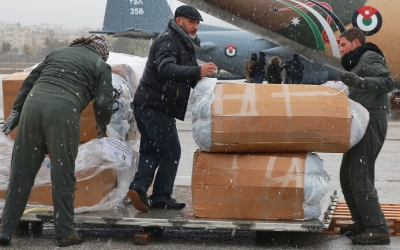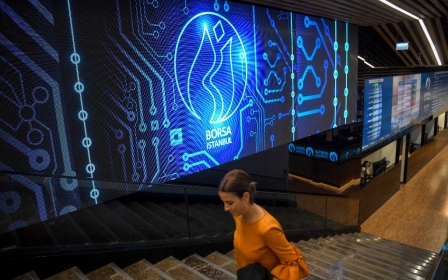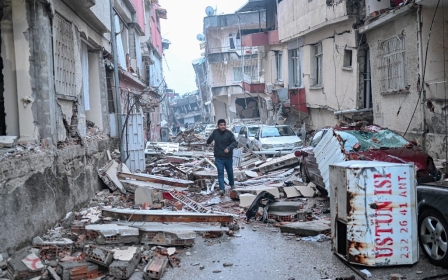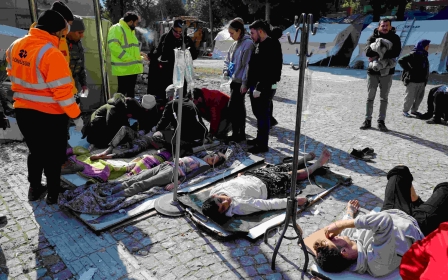Turkey earthquake: Volunteers across the country mobilise to help victims
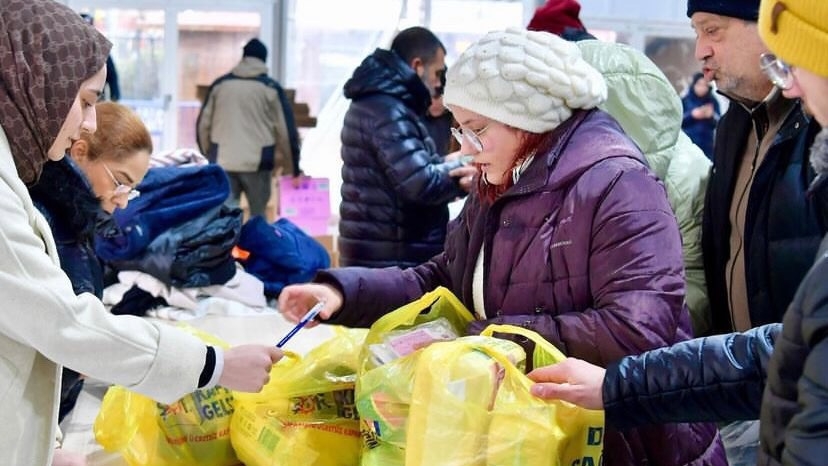
When Saliha Gencay, a 46-year-old teacher from the northwestern province of Sakarya, first heard about the double earthquake to hit the south of Turkey on Monday, she immediately thought of what she could do to help those most affected.
A few phone calls later, it was agreed that the Farabi High School where she works should be used as an aid centre.
On Tuesday morning, Gencay and her colleagues opened their school to streams of volunteers who brought unused clothes, winter wear and shoes.
'My eyes fill with tears in these moments, seeing people coming together and doing this kind of aid work'
– Gencay, teacher and volunteer
Since then, they have been boxing up donations and giving them to Turkey’s Disaster and Emergency Management Presidency (AFAD), which sends them to the most affected areas.
“I have friends and students in the areas most affected by the earthquake," Gencay told Middle East Eye. "I have spoken to some of them, they are very tired and worried."
“People in Turkey are very empathetic and we as a people attach great importance to unity. I think this feature belongs to us. That's why we will get through this by helping each other,” said Gencay.
With temperatures in single digits during the day and dropping to below zero at night, the situation for survivors is bleak.
The disaster, which has now caused at least 11,000 deaths across Turkey and Syria, has stretched state resources. The Turkish government has declared a state of emergency in 10 Turkish provinces. More than 10 million people in the country have been impacted by the earthquakes.
Gencay is from Sakarya, which was hit by a catastrophic earthquake in 1999 that left more than 17,000 people dead.
“Earthquakes are an experience that my people have been deeply impacted by and find difficult to process,” she said. “Buildings should be built more carefully.”
Questions are being asked about Turkey's building regulations and whether construction firms cut corners.
For now, however, the focus for many volunteers is to ensure that as many lives are saved and that the state is doing all it can.
“Because this is a sudden and unpredictable event, it falls to the state to manage this crisis. But... my people are incredibly resourceful and resilient. My eyes fill with tears in these moments, seeing people coming together and doing this kind of aid work,” said Gencay.
Scenes such as the one in Gencay’s high school are being repeated up and down the country.
On Tuesday, thousands of volunteers made their way to Istanbul airport to fly to the affected area. Others have driven.
Yakup, 33, from Istanbul, spoke to MEE as he was approaching Adiyaman, one of the worst-affected cities: “You cannot imagine how bad it is,” he said.
With seven members of his family in convoy, Yukup made the 16-hour journey in a car and a large van filled with blankets, nappies, sanitary products and more.
“The state and other NGOs are not enough by themselves to deal with this earthquake, it's such a big area... I feel that I should contribute to this effort and other ordinary people should also take action,” said Yakup, who didn’t want to give his full name.
“People in this city don't have homes any more."
‘We feel ashamed for living in such privilege’
Irem Danalioglu, 29, a content management specialist at Turk Telekom International, took the day off work to volunteer in Istanbul's Fatih district.
“When the municipality in the area where I live announced on social media that they need volunteer employees, within hours of the centre opening up thousands came to help,” Danalioglu told MEE.
Hundreds of people brought brand new coats, boots, sweaters, socks, electric heaters - all of which are urgently needed.
Though the epicentre of the earthquakes was several hundred kilometres away, many Istanbulites are also worried: the city is close to the 1,500km-long North Anatolian Fault line.
“We are also afraid as a family, constantly waking up during the night, and we don’t lock the door of the house so that we can easily escape if there is an earthquake here also,” said Danalioglu.
'The state and other NGOs are not enough by themselves to deal with this earthquake. I feel that I should contribute to this effort'
- Yakup, volunteer
“We’re watching the news with my mum and she is crying, seeing all the suffering. Believe me, we feel ashamed for living in such privilege, because people are dying and we’re just sitting at home,” she added.
On the other side of Istanbul, in the district of Uskudar, a group of a dozen friends have been sending out appeals on social media, urging people to donate money or essential products that they will send to the worst-hit areas.
“We know many people affected by the earthquake," Ahmed, one of the group, told MEE, "friends and extended family - as many people in Istanbul migrated from the earthquake-affected regions."
By Tuesday evening, Ahmed and his friends had built a volunteer team to gather donations and critical resources.
“We managed to connect with everyone - from local supermarkets to industrial suppliers - to acquire resources and send them to the earthquake-affected regions,” added Ahmed.
A steady stream of volunteers are also helping fill large vans driven by volunteers to Hatay and the areas around Gaziantep.
For Ahmed, “the earthquake has brought home how unprepared Turkish infrastructure and society is".
Middle East Eye propose une couverture et une analyse indépendantes et incomparables du Moyen-Orient, de l’Afrique du Nord et d’autres régions du monde. Pour en savoir plus sur la reprise de ce contenu et les frais qui s’appliquent, veuillez remplir ce formulaire [en anglais]. Pour en savoir plus sur MEE, cliquez ici [en anglais].


